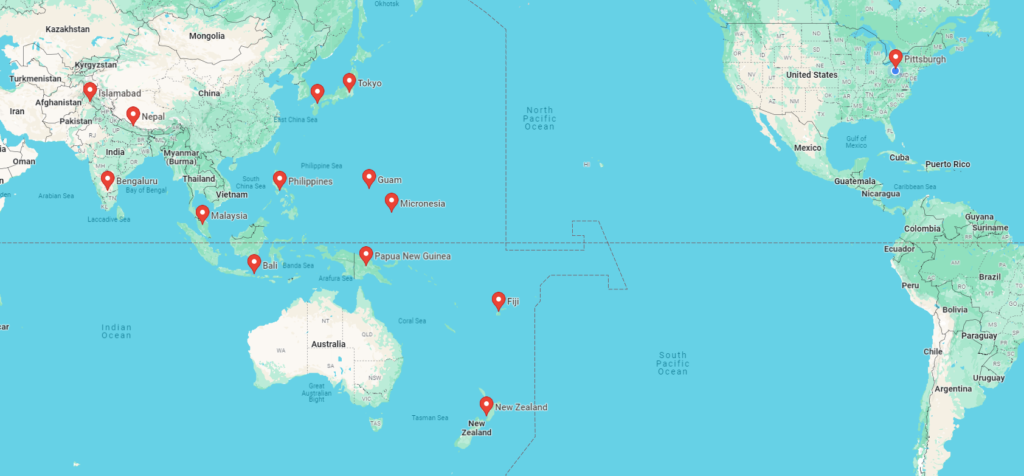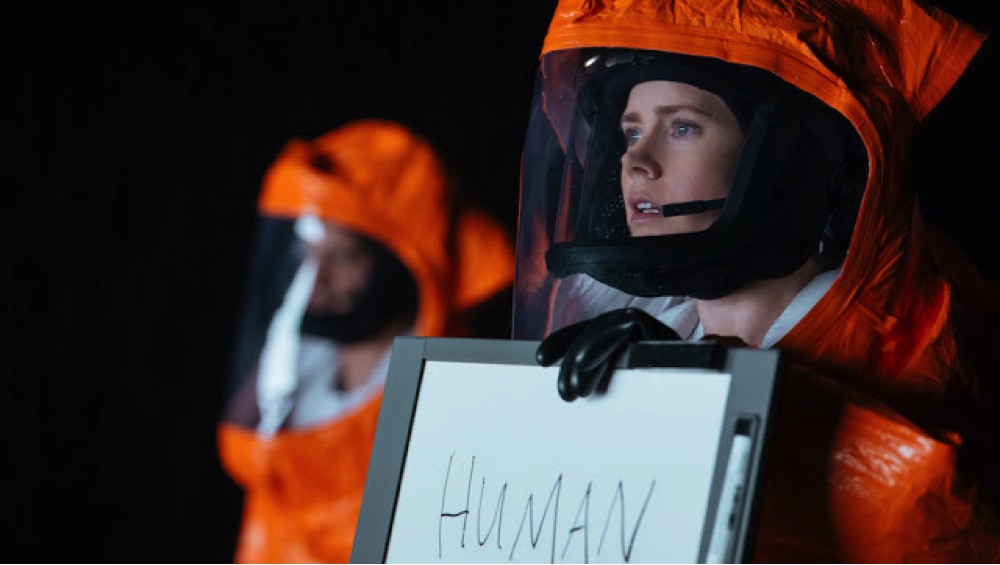<– Start at the beginning of the Climate Lab series
I recently shared some exciting news about my acceptance into a multi-national climate leadership program that will take place over the course of a year, ending in September 2024. [1] Our cohort has already had several virtual sessions, which have focused on getting to know each other and our work, as well as examining theory and implementation of various aspects of climate change adaptation. Since the approach of the program is, in part, learning from each other and applying those lessons to our own work, I have done a lot of self reflection so far – some as assignments for class, and some for my own exploration. It is my intention to periodically share some of those insights on this blog as we progress through the year.
Getting to Know You
As I noted in my last post on the subject, I was surprised to receive an acceptance letter from the program in the first place, but my impostor syndrome really kicked in when I read the biographies of the other members of my cohort. [2] There are some very impressive people in this group, and I have had to remind myself that the program leaders know what they’re doing by including me. (That doesn’t mean I haven’t been working extra hard to justify my place among the group!) We began our first session with a lot of time to introduce ourselves and get to know each other.

Mapping courtesy of Google Maps: [3]
Among our group of 16, we have a range of nationalities (spanning 12 countries), and a diverse set of backgrounds. Of course, that diversity makes sense if we’re looking to generate systemic solutions to the current climate crisis: a concept that stood out in one of our first readings was that the strength of a system is dependent upon the diversity of its components. To that end, our group is made up of individuals who hail from non-profit / non-governmental organizations as well as the for-profit / business consulting worlds, with perspectives from academia and journalism as well. Our respective work runs the gamut from environmental and resource conservation, to human rights and equity, to international relations and development, to climate change and sustainability.
I’m not sure if I was more surprised or pleased to discover that even in our earliest conversations, we noticed strong themes in the issues we face on a regular basis, and public health was a big one. When it comes to climate change mitigation or adaptation, we saw extreme needs for learning and teaching on multiple fronts. Unfortunately, there is an incredible amount of siloing in place and a lack of effective communication, no matter how you slice it: there are disconnects between communities (even countries) dealing with similar climate impacts, between policymakers and the people impacted by their policies, and even between professional sectors trying to develop solutions to the climate crisis. So here we are, striving to learn from each other and apply those lessons to our work.
Non-Zero-Sum Game
Promoting that intersectionality began with some examination of theory, particularly theory that focused on the interconnectedness of the human experience. Now, this area is supposedly my bread and butter: my graduate research focused on the concept of “superordinate identity,” [4] which basically means that as we label and organize ourselves into groups, we’re more likely to trust and work with people in our own self-defined group… or community, if you will. The larger and more inclusive my group label becomes (e.g. Pittsburgher → Pennsylvanian → American → human), the more likely I am to see others within that group as being on my side, and the more likely I am to collaborate with them for collective problem solving. I spoke to this concept in my previous blog post on getting through the climate crisis together. [5]

Image credit, from an article with major spoilers: [6]
This concept is fantastic in theory, but it’s a little harder to implement in practice because we’re humans, and humans are complicated. Notably, the problems we’re trying to address and our respective frames of reference that inform our solutions to those problems only go about as far as that self-defined label. And whenever we’re talking about anything with high stakes – from an existential climate crisis to getting sufficient funding in the door to run our organizations – our labels, our communities, our perspectives, and the systems we’re evaluating tend to shrink. In that case, it is also incredibly easy to shift from a non-zero-sum game, “we win together” mindset to a zero-sum, “I win, you lose” mindset – and I see a lot of that in the business and political arenas, particularly.
I recently learned about a toast Oppenheimer frequently gave over drinks: “to the confusion of our enemies.” [7] My immediate first thought was how much I would love to adopt it myself (particularly at work functions), but my almost immediate second thought was that no one is our enemy, even though they think they might be, and even though we might – from time to time – think they are. As much as I get a kick out of being called names in Letters to the Editor penned by fossil fuel industry representatives, I also recognize that that “us vs. them” mentality is indicative of a larger problem, one based on a limited perspective. The mental shift that needs to happen (and again, recognizing this bit is far easier said than done) is recognizing the concept that “you don’t have to lose for me to win.” But it will take higher-level labels, more inclusive tables, and longer time scales for defining success.
You’re Gonna Need a Bigger Boat
As if that bit weren’t difficult enough, it is at least a concept with which I am comfortable. Something that was far more challenging for me to stomach was the concept that there is no solution, as we may define the word. Put more simply, there is no one right approach to addressing such a complex crisis; there is also no end point at which we will be able to say that we have succeeded. For those of us who came of age defining success in a more academic, project-based, rubric-filled world guided by discrete assignments and final grades, the concept of a problem without clear deliverables or even a deadline is bewildering, if not exhausting. But the idea is that for something this complex, something this large, something this long-term, we need an iterative process of continuously assessing and responding to it as it evolves and as the goalposts move; we need to build technical skill sets to address the problems we can see coming, as well as improvisational abilities to address the ones we can’t.

Image credit: [8]
In order to define those problems and develop responses more effectively, we need to have more diversity at the table, but we also have to recognize that there can be significant barriers to getting people there in the first place (let alone truly listening to them once they’re there). One concept that resonates with me, which I see frequently as part of my work, is that not everyone who should be at the table even knows about it, nor can they necessarily get there. I see everything from apathy (from people who are ignorant about a given issue) to overwhelm (from people who know far too much about it), and there really needs to be a balance somewhere in the middle for someone to get involved: you generally need to be impacted by an issue enough to care about it but not so much that you’re in full self-preservation mode and lacking the necessary time or energy for self-advocacy.
And for that reason, we often see situations in which those most impacted by a decision are excluded from the decision-making process. Working toward more inclusivity in understanding problems and more equity in addressing them is incredibly difficult, time-consuming, and uncomfortable – and humans, in general, tend not to like those things. We also tend to dislike admitting when we’re wrong or giving up control, but those are essential components to working collaboratively, especially when those collaborations include perspectives we don’t understand. I recently attended a coalition meeting for work in which we were asked to brainstorm a list of people and groups not at the table with us – and to get creative with our ideas. Once we were done, the facilitator asked if anyone on the list made anyone in the room uncomfortable, and when a few heads nodded, she said “Good: that means we’re on the right track.”
Having an MBA, being the leader of an organization, I often feel the pressure to adopt a “fake it ‘til you make it” attitude when I’m uncertain about something. There are a lot of expectations when people look to you to make decisions, and those decisions can seem arbitrary when you admit what you don’t know. (And why should anyone respect an arbitrary decision?) However, I will also say from personal experience that I believe leaning into vulnerability like that has resulted in more trust built than trust lost over the years, even if it makes me incredibly uncomfortable. It also helps me to identify my knowledge gaps and my blind spots, which is, after all, the first step in addressing them.
~
There is so much more I have to say on this subject, but we’ve got a long year ahead, and I’ll have plenty more opportunity to write, right here.
In the meantime, thanks for reading!
The Indo-Pacific Leadership Lab [9] is a program of the East-West Center,[10] with support from the Japan Foundation.[11]
As always, content on this blog reflects my personal views, and not those of any organization with which I am associated.
[1] https://radicalmoderate.online/climate-lab-first-steps/
[2] https://www.eastwestcenter.org/projects/2023-2024-indo-pacific-leadership-lab
[3] https://www.google.com/maps
[4] https://link.springer.com/chapter/10.1057/9781137011435_10
[5] https://radicalmoderate.online/saving-us-getting-through-2022-together-part-2/
[6] https://indiaindependentfilms.com/2017/02/21/arrival-palindromes-non-sum-zero-games-feature/
[7] https://www.washingtonpost.com/food/2023/07/25/oppenheimer-martini-gin-honey/
[9] https://www.eastwestcenter.org/projects/indo-pacific-leadership-lab
[10] https://www.eastwestcenter.org/
0 Comments